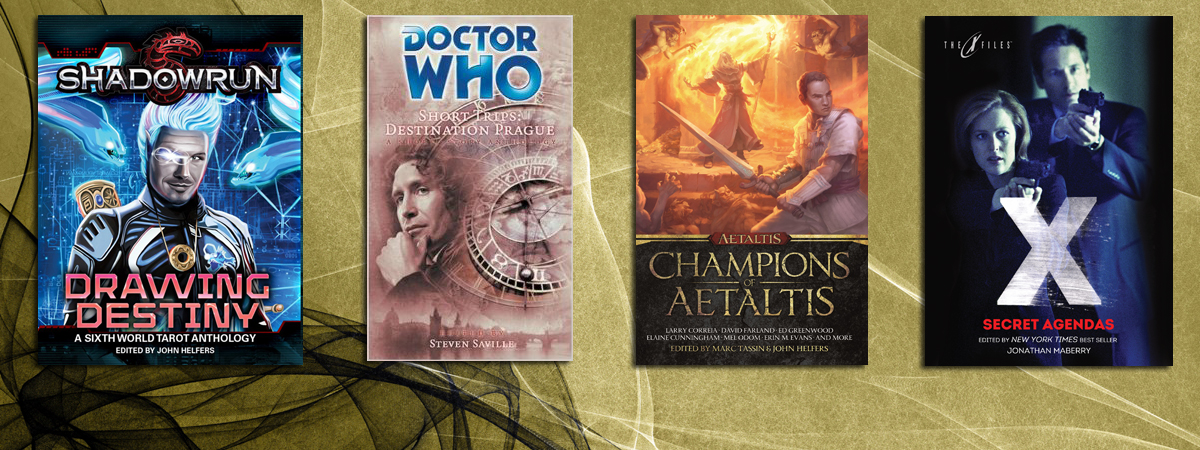
A shared world anthology (also known as a shared universe anthology) is a type of themed anthology in which the writers create works – usually stories, but sometime poetry or sequential art – exploring the same fictional world. If the fictional world is already known in popular culture, the writers are also likely to use the same characters.
Media tie-in anthologies that offer stories about the characters from popular shows such as Doctor Who or The X-Files or games such as Shadowrun are inherently shared world anthologies. Another common type of shared world anthology is one that focuses on the worlds, monsters and characters established by popular deceased authors such as H.P. Lovecraft.
A third type of shared world anthology involves the writers cooperatively building an entirely new fictional world. This is a less common type, but the aim of such an anthology is often to generate interest in the world and characters so that readers will be interested in more works related to them. For instance, a publishing company that is planning to release a new role-playing game might recruit writers to create stories for a shared world anthology about the game characters and settings, which the company plans to launch at the same time as the anthology. Because that game world isn’t completely established yet, the world building work that the story writers do might very well end up reflected in the game.
If the editor is ambitious enough to get the writers coordinate their narratives so that the stories as a whole create an overall plot, the anthology can read like a braided or mosaic novel; this is an uncommon tactic because it requires much more work for the editor and an unusual amount of cooperation and communication amongst the writers. Editors usually have their writers at least partly coordinate their stories in order to provide a better story flow and reading experience. For instance, in a Doctor Who anthology that’s supposed to provide a good mix of stories about different Doctors, the editor would want to ensure that his or her writers don’t all write about the Tenth Doctor and Donna Noble.
As another example, I recently wrote a story for an anthology for a Lovecraftian anthology entitled The Return of the Old Ones. The theme is right there in the title: malign, powerful Lovecraftian gods such as Cthulhu and Mother Hydra are rising on or returning to Earth to subjugate humanity. But the editor went a step further: he wanted an equal mix of stories focusing on events leading up to the return, events during the return, and events after the apocalypse. So when he put out his invitation to submit, he asked us all to tell him which phase we wanted to write about and asked for a nutshell story synopsis detailing the basic themes and monsters we’d be working with. Once he had that information, he could figure out what the book might look like, and contacted writers whose proposals didn’t seem to fit to suggest alternatives.
Writing for shared world anthologies can be rewarding and fun, but it requires a willingness to compromise, an ability to write fiction to order, and an ability to do research. If you’re writing for a television show or other media property, you will probably receive a writer’s “bible” with extensive details about the setting and characters. Game companies might send you a whole bunch of rulebook PDFs and expect you to sort through them to find the details you need. If you’re invited to write for an anthology based on a world established by a popular author, the editor likely won’t send you anything but will expect you to have read the author’s work on your own, and read it closely enough to write in his or her worlds.
As a writer, you will probably have the most leeway when writing for shared worlds from literature; if you want to create a Lovecraftian protagonist who is a disabled woman working a phone sex line (something that would have Lovecraft spinning in his grave), the editor will likely be okay with that if the story’s good. But expect strict vetting and content restrictions on media tie-in work. The game company will frown upon your paladin deviating from her lawful good alignment for a laugh, and the BBC representative will not be okay with the Doctor instigating a threesome with Nikola Tesla and The Scarlet Pimpernel, no matter how hot the scene is.
Furthermore, shared world stories you write for game anthologies or other media tie-in anthologies will often (but not always) be treated as work for hire, and in exchange for your payment you sell away all your rights to those stories. Always check the terms of your contract. Sometimes you will be able to retain the right to republish your story in your own single-author collection but will be otherwise forbidden to republish it. Publishers of anthologies about shared worlds from literature tend to just treat the stories as regular stories and you will be free to reprint your work after the exclusivity period (usually 6 months to 2 years) is over.
Leave a Reply
You must be logged in to post a comment.